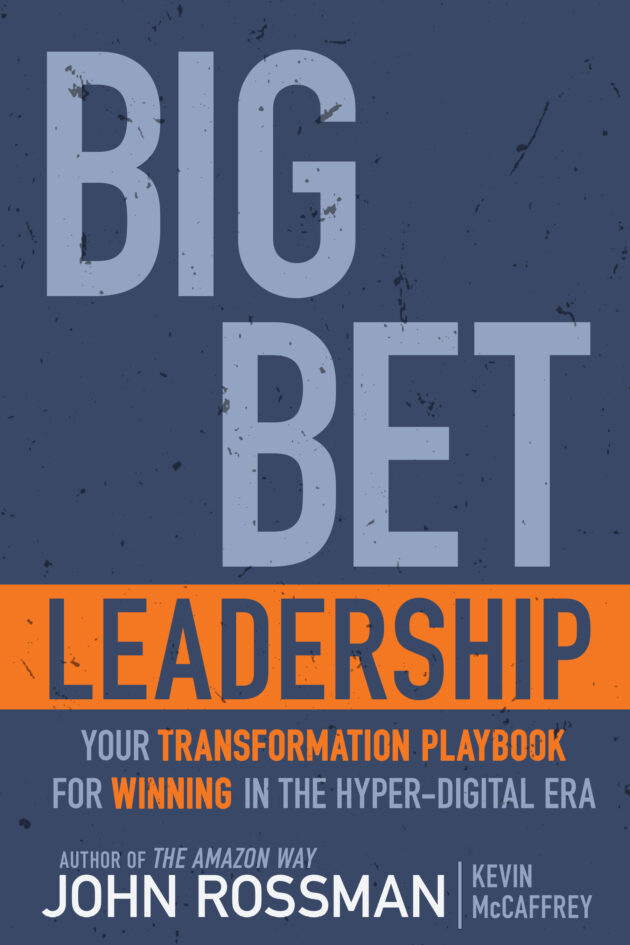
At the outset of their new book, “Big Bet Leadership,” authors John Rossman and Kevin McCaffrey identify three “mega forces” that they believe could define the years ahead for businesses and the economy:
- Disruptive technologies such as generative AI and quantum computing
- The aging of America’s workforce.
- Increased spending on entitlement programs such as Social Security and Medicare, and the looming cost of serving the U.S. debt.
They write in the book, “These mega forces will feed into each other like a vortex, building an overriding theme for business and society—that of a chaotic environment of dramatic change with successful business operators realizing productivity and cost model advantages that separate them from their competition.”

Their thesis: companies that thrive in this chaos will be the ones that master the art of “big bets,” transformative moves that dramatically expand their capabilities and the potential of their businesses.
“Big Bet Leadership” is a playbook for systematically making those bets in a way that reduces risk and increases long-term flexibility, drawing lessons from the likes of Microsoft, Amazon, T-Mobile and SpaceX, while also leaning heavily on the first-hand experience of the authors in overseeing and implementing big bets.
Rossman is a former Amazon executive who was a key figure in launching Amazon’s Marketplace, with more than three decades in technology and business innovation in his career. He has authored books on digital innovation, including “The Amazon Way,” advised major companies, and founded Rossman Partners.
McCaffrey has served in strategic roles at companies including T-Mobile and Google, taking part in growth initiatives and transformations including efforts to expand T-Mobile’s “Un-carrier” initiatives beyond its core wireless business. He has also consulted with McKinsey & Co. He now works with Rossman Partners.
Big bets “come by lots of different names: a growth strategy, a market repositioning, a digital transformation, an AI strategy, an operating change,” Rossman explains. “These are all initiatives or strategies that have high potential for impact.”
Why focus on big bets now?
“We’re entering an era where more change is happening, and more disruption is happening,” Rossman says. “The ability to separate the future winners and losers is going to come from the ability to actually make bold moves. Paradoxically, we know that the vast majority of these big bets fail, but yet, we have to do more of them.”
“You can’t wait until you need a big bet to place it,” McCaffrey adds. “If you haven’t already positioned yourself by placing early bets that you keep small … once the industry trends start to become clearer, and the market opportunity becomes clear, it’s too late. Somebody else is going to take the opportunity.”
These are some of the keys to “Big Bet Leadership,” gleaned from the book and the podcast conversation with Rossman and McCaffrey:
- Take a systematic approach, managing a portfolio of smaller experimental bets to gain strategic flexibility, and establishing standard processes like dedicated teams and documentation to maintain momentum on big bets.
- Assign “single threaded leaders,” fully dedicating the best talent and leadership to each big bet through cleared plates and priorities, rather than overseeing big bets as a secondary duty or with divided attention.
- Clear obstacles proactively, gaining executive sponsorship to adjust policies that could inadvertently slow down big bets, such as procurement and IT procedures, before teams are formed and work begins.
- Maintain velocity by prioritizing big bets over day-to-day operations through dedicated resources and teams, as well as metrics to ensure they do not lose momentum through scope creep or competing priorities.
- Develop clear memos and documentation, including a process of critical thinking exercises to fully examine risks, opportunities, and stakeholder concerns before committing to large-scale plans or investments.
- Present three realistic future options, allowing stakeholders to critically assess the tradeoffs of each without being led to a predetermined solution, and surface concerns that teams can address before momentum is lost.
- Learn from failures by systematically deciding to continue investing in strategically important ideas, pivot based on learning, or end initiatives based on outcomes rather than confusion or lack of commitment.
“Big Bet Leadership: Your Transformation Playbook for Winning in the Hyper-Digital Era,” is available on Amazon. Also see John Rossman’s newsletter, “The Digital Leader.”
Audio editing and production by Curt Milton.
Listen to the full conversation above, or subscribe to GeekWire via Apple Podcasts, Spotify, or wherever you listen.

